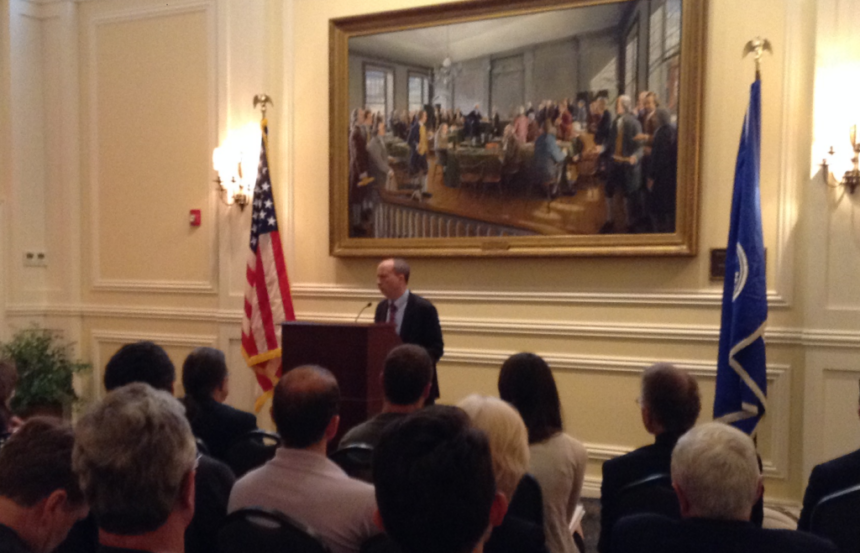
Yuval Levin, founding editor of domestic policy journal National Affairs, spoke on “Renewing America’s Social Contract in the Age of Individualism” to promote his new book, The Fractured Republic, at Hillsdale’s Washington, D.C. campus, the Allan P. Kirby Center for Constitutional Studies and Citizenship, Tuesday.
Levin’s talk focused on the problems both liberals and conservatives face in the present political climate and how these problems arise from the fact that both factions view the role of government in society broad philosophical terms, without an eye to specific policies. He criticized conservatives in particular, and then offered his own vision of government.
“When you think about the national government, its role is to protect the entire space between the individual and the state,” Levin said. “Its role is not to fill that space. Its role is to protect that space. There are other institutions — institutions of civil society, family — that fill that space properly. I think that vision is the vision of the American founding and of the American republic.”
He then outlined how conservatives could enact specific policies and become more effective leaders in their communities.
“Social conservatives need to be more and less political in two distinct ways. We need to be more political in that we need to understand ourselves as arguing for a particular political vision. The argument that the core of what happens in society is in the institutions that sit between the individual and the government is a political vision,” he said. “We have to be less political in the sense that we have to be less focused on how our communities live and what we do in them. That being said, the idea that we can just turn inward to escape American life is not what we need to be doing.”
Conservatives, he argued, have become too fixated on abstract ideals and need to recover the ability to focus on actually solving America’s problems.
“Ronald Reagan didn’t talk about conservatism, he talked about solutions,” Levin said.
Levin also addressed the issues in the current presidential election and offered ideas on how conservatives could use the situation to their advantage.
“We’re facing a situation in which both major party presidential candidates ought not be President of the United States. That’s a situation I have not confronted in my time as a voter, so it’s challenging to confront,” he said. “I don’t think that one way or another that this election is going to be the end of the Republic. And I think we need to keep perspective. This is an opportunity to think about strengthening Congress and to realize that presidential elections are not a question of life or death for the country.”
Levin ended on a hopeful note, observing that the chaos in America’s current political system offers a great opportunity for conservatives to fill the voids left by failed liberal policies.
“The reason that we can be hopeful is that it is pretty clear to a lot of Americans that the system we have is not working. There is not the great expectation out there that the next great national program proposed by the Democrats is going to work wonderfully. And there is not a sense that the last one worked wonderfully. There is an opening there for thinking differently about how to solve our problems,” he said.
Jack Whelan, a Princeton student attending the event, said that Levin divides American political philosophy into two opposing camps that focus more on a foregone age than on the present issues at hand.
“Mr. Levin notes that Democrats harken back to the days of the ‘Great Society’ while Republicans idolize the America of the Reagan era. In his view, American politics largely revolves around these two models without an avenue for new ideas on either side of the aisle,” Whelan said.
Levin’s talk was his second for a Hillsdale audience in four months, and in February, he visited the college’s Michigan campus to share his views on foreign policy.
Louis McHale, a local high school student attending the event, said the Kirby Center allows the public to become more acquainted with college and its values.
“The Kirby Center has exposed me to Hillsdale College in a way that gave me true picture of the caliber of its academics and mission on a level that I have never found anywhere else,” McHale said.
The Kirby Center often hosts events such as this one, inviting writers and speakers from around the country to present a talk on their subject of interest followed by a question and answer period. All such talks are open to the general public free of charge.
The Fractured Republic was released on May 24 and is available online at Amazon and in most major bookstores.

